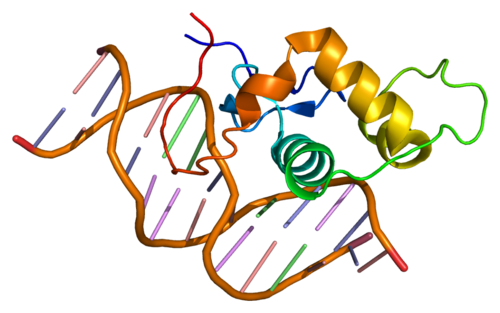Estrogen-related receptor alpha (ERRα), a protein in the nucleus of breast cancer cells, plays a key part in the growth of aggressive tumors – new medications that undermine the activity of the protein might help treat some types of breast cancers known as estrogen receptor negative cancers, researchers from the Duke Cancer Institute reported in the journal Cancer Cell.
Estrogen receptor negative cancers are aggressive – current hormone therapies are not effective. Three-quarters of breast cancers are driven by estrogen, while 25% of them are not (estrogen receptor negative cancers).
Senior author, Donald McDonnell, PhD, chairman of the Duke Department of Pharmacology and Cancer Biology, said:
“This is validation of a new drug target for a subset of breast
cancers that have poor treatment options.”
HER2-positive tumors are among those that are not driven by estrogen. In such cases there is too much human epidermal growth factor receptor 2 on the surface of cancer cells.
The problem with treatments aimed at disabling HER2 activity is that the tumors commonly become resistant, and tumor growth resumes.
McDonnell and team concentrated on a protein that exists inside the tumor cell – ERRα – which has a relationship with HER2. ERRα was first detected in the 1980s and erroneously classed as an estrogen receptor. ERRα controls the genes that drive energy metabolism – it is not an estrogen receptor.
However, ERRα does seem to be involved in encouraging breast cancer tumor growth. The team found a link between ERRα activity and the aggressiveness of estrogen-negative breast cancers after using a genomic analysis to profile 800 tumors.

Estrogen-related receptor alpha (ERRα)
McDonnell said:
“When that ERRα receptor is active, the outcome of these patients is much, much worse. The question is why?”
ERRα seems to trigger tumor growth after receiving a signal from such hormones receptors as HER2 and IGF-1R. IGF-1R binds to an insulin-like hormone. In any breast cancer tumor where IGF-1R or HER2 are active, ERRα is subsequently active too. This scenario is common in estrogen receptor negative cancers.
The researchers used an investigational drug to see whether they could inactivate ERRα in cellular breast cancer models, even though they were not sure what caused its activation. The medication managed to stem the proliferation of the tumor cells.
McDonnell said:
“There are a lot of proteins that play important roles in breast cancer pathogenesis, but disappointingly, the activity of only a few of these proteins can be inhibited by drugs.
In contrast, it’s relatively easy to interfere with ERRα’s function. So instead of looking for the pathways that lead to ERRα activation, we can aim directly at the target ERRα. It doesn’t matter what’s upstream.”
As ERRα is active in colon, ovarian and some other cancers, the investigational drug could be applied to other cancers apart from breast cancer, McDonnell said.
McDonnell said:
“The initial excitement is we have found a target that seems to be important for estrogen-negative cancers.”
The scientists are currently trying to find out why breast cancer tumors become more aggressive when ERRα is active. They are also helping develop new medications to block the activity of this receptor.
Written by Christian Nordqvist